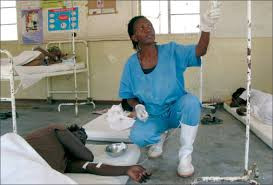
IN Zimbabwe, the healthcare situation has become dire. Public hospitals, which provide essential services to the community, are struggling. Nurses are raising their voices in despair, saying, “We are working under impossible conditions.
This statement highlights a huge problem: the government is not meeting the healthcare needs of its people. When a government neglects the health of its citizens, it shows lack of compassion and responsibility.
Public hospitals are vital to the healthcare system in Zimbabwe. They serve the largest number of patients and are the first point of care for many people. However, these hospitals are severely underfunded.
This means they do not have enough money to buy medical supplies or pay staff. As a result, patients often find themselves in very difficult situations. They may have to buy medicines or even go to private hospitals, where the cost is often too high for most families. This kind of situation is heartbreaking and shows a heartless attitude towards the suffering of ordinary citizens.
National and international frameworks
There are rules and guidelines, both in Zimbabwe and around the world, that stress the importance of healthcare. The Zimbabwe National Health Policy states that everyone should have access to “quality health services”. This means the government must provide quality healthcare to all people.
At an international level, the World Health Organisation emphasises the need for universal health coverage. This means that every person should be able to access the healthcare services they need without worrying about payment. These frameworks clearly show that the government should take care of the health needs of its citizens. When it fails to do so, it is not just neglecting its duty; it is also putting the lives of its people at risk.
The impact of neglect
- Beware of fake nurse aide certificates, says ZRCS
- Beware of fake nurse aide certificates, says ZRCS
- Red Cross vaccination go into overdrive
- . . .the elderly struggle to access healthcare, bare basics
Keep Reading
The effects of neglecting healthcare are severe. When public hospitals do not have enough resources, patients suffer. Many people are forced to wait for long periods for care. Some might even die waiting for treatment that could have been provided if the hospitals were adequately funded. This situation creates a cycle of suffering. Families face emotional and financial burdens as they try to provide care for their sick relatives.
Moreover, healthcare workers, especially nurses and doctors, are overwhelmed. They are doing their best under challenging circumstances, but they need support. When they do not have the right tools or are short staffed, it becomes very hard to offer good care. This situation can lead to burnout among health workers, making it even harder for hospitals to function effectively.
Solutions for improvement
The first step is to increase funding for public hospitals. The government should allocate more resources to healthcare. This means ensuring that hospitals have enough money to buy essential medical supplies, such as medicines, equipment, and even basic items like blankets for patients. Improving hospital buildings is also crucial. Many hospitals are in poor condition, with crumbling walls and leaking roofs. When hospitals are well-equipped and maintained, they provide better care to patients.
Another important solution is to improve staffing and training for health workers. The government should hire more doctors, nurses and support staff. With more workers in hospitals, patients receive the attention they need quickly. Additionally, providing ongoing training for healthcare workers is essential. This helps them to stay updated on the best practices in medical care. Well-trained health workers can provide high-quality care, which leads to better patient outcomes.
In the same vein, establishing community health programmes can also make a significant difference. These programmes can focus on preventive care, which helps to reduce the number of people who need emergency services. For instance, educating communities about basic health practices, nutrition, and hygiene can lead to healthier populations. When people are aware of how to take care of their health, they are less likely to get sick. This reduces pressure on public hospitals and allows them to focus on treating those who are truly in need.
Lastly, it is essential to advocate for mental health support. The stress and trauma experienced by patients and healthcare workers can lead to serious mental health issues. Providing mental health services within hospitals can help to support both patients and staff. This can create a more compassionate and understanding environment in healthcare settings.
On this score, the heartlessness of a government that neglects its people’s health is evident in the cries of nurses and the suffering of patients. By prioritising healthcare, the Zimbabwean government can show compassion and fulfil its duty to protect the well-being of its citizens. The time for action is now; the health of a nation depends on it. Each of us deserves to live in a society where healthcare is a priority, and where every person can access the medical help they need without fear or financial burden.
- Raymond Tendai Rusinga is an independent researcher and policy analyst in Harare. He writes here in his personal capacity. For feedback email: rayrusinga02@gmail.com or contact +263 776 206 227










